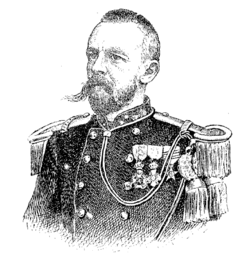Francis Dhanis
| Francis, Baron Dhanis | |
|---|---|
|
Francis Dhanis | |
| Born |
11 March 1861 London, United Kingdom |
| Died |
13 November 1909 Brussels, Belgium |
| Nationality | Belgian |
| Other names | Francis Dhanis |
| Occupation | military officer |
| Known for | 1892-1894 war in the Eastern Congo |
Francis Dhanis (1861–1909) was a Belgian colonial civil servant and soldier noted for his service for the Congo Free State during the Congo Arab War and Batetela Rebellion.
Biography
Early life and military service
Dhanis was born in London in 1861, the son of a Belgian merchant and of an Irish woman named Maher. He spent the first fourteen years of his life at Greenock, where he received his early education. After completing his education at the Royal Military Academy in Brussels, he entered the Belgian army, joining the Regiment of Grenadiers, in which he eventually rose to the rank of Major.[1]
In the Congo Free State
As soon as he reached the rank of Lieutenant he volunteered for service in the Congo Free State of King Leopold II of Belgium, and in 1887 he went out for a first term. He did so well in founding new stations north of the Congo that, when the government decided to put an end to the Arab domination on the Upper Congo, he was selected to command the chief expedition sent against the slave traders in the war in the Eastern Congo.[1]
The campaign began in April 1892, and it was not brought to a successful conclusion until January 1894. The story of this war was narrated in detail by Dr. Sydney Hinde, who took part in it, in his book The Fall of the Congo Arabs. The principal achievements of the campaign were the capture in succession of the three Arab strongholds at Nyangwe, Kasongo and Kabambari. For his services Dhanis was awarded the rank of baron, and in 1895 was made vice-governor of the Congo Free State.[1]
In 1896 he was given command of an expedition to the Upper Nile. His troops, largely composed of the Batetela tribes who had only been recently enlisted, and who had been irritated by the execution of some of their chiefs, allegedly for cannibalism, mutinied and murdered many of their white officers in what has become known as the Batetela Rebellion.[1] Unlike the Arabs, the Batetela were well-armed and disciplined. For two years (1897–1898), Dhanis was constantly occupied by the rebellion. Eventually he succeeded in breaking up the several bands of Batetela. In 1899 Baron Dhanis returned to Belgium with the honorary rank of vice governor-general.[1]
Later life
He died in Brussels on the 13th of November 1909.
Notes
- 1 2 3 4 5
 One or more of the preceding sentences incorporates text from a publication now in the public domain: Chisholm, Hugh, ed. (1911). "Dhanis, Francis". Encyclopædia Britannica. 8 (11th ed.). Cambridge University Press. p. 142.
One or more of the preceding sentences incorporates text from a publication now in the public domain: Chisholm, Hugh, ed. (1911). "Dhanis, Francis". Encyclopædia Britannica. 8 (11th ed.). Cambridge University Press. p. 142.
References
- Dhanis, Francis, baron, La campagne arabe., Bulletin de la Société royale de Géographie d'Anvers, vol. 30, 1906, pp. 58–63
External links
| Wikimedia Commons has media related to Francis Dhanis. |
